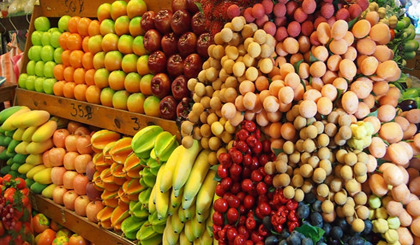Local fresh produce losing market share to Thailand
Hanoi Supermarket Association chair Vu Vinh Phu told stakeholders at a recent business conference that Vietnamese consumers have lost confidence in home grown fresh fruit and vegetables.
Farmers and local wholesalers are not benefiting from the large number of free trade agreements such as the ASEAN Economic Community, declared Phu. Those trade deals have just resulted in more imports of fresh produce streaming across the border at the expense of the domestic sector.
Phu said he would like to see free trade take root in the country but as long as the situation continues like this— the country as a whole is not benefitting and he prefers protectionist measures be put in place.
The supermarkets are not being hurt as much because it doesn’t affect their sales or earnings, he added, but the imports are taking a heavy toll on the smallholder farmers and ancillary businesses, sending the domestic sector into a tailspin.
 |
He suggested the country should return to bilateral trade agreements and only import fruit and vegetables that it can’t be produced locally such as cherries— and ban imports of longan, mango, durian and dragon fruit.
That’s in large part due to the fact that the country’s competitive ability in terms of quality and price is still much too weak, Phu said.
A report released recently by the Vietnam Fruit and Vegetables Association showed that Thailand had jumped into the first position on the list of the biggest fruit exporters to the country.
In the first two months of the year, food distributors imported US$82 million of fresh produce from Thailand, which represents a 50% share of the market. China in turn accounted for a 19% market share.
The Vietnam Trade Research Institute has also raised concern over the rising level of imports of fresh produce from Thailand, reporting that about one out of every two dollars of imports is now coming from the western neighbour.
Nguyen Thanh Ha, deputy director of the Thu Duc Wholesale Market in Ho Chi Minh City, has said the situation has nothing to do with trade agreements but is grounded in the fact that consumers do not trust the food safety of locally grown produce.
Ha said the answer lies in restoring the trust and confidence of consumers in locally grown fresh fruit and vegetables. For starters, he suggested all parties in the supply chain comply with VietGap (Vietnamese Good Agricultural Practices).
The situation is much more complicated than placing embargoes and higher import charges on imported goods to help local producers sell their goods. One way or another fruit and vegetables will find their way across the border from Thailand and China into the country, he underscored.
Just as importantly, added Ha, is the fact that the wholesale and distribution system for fresh produce is increasingly becoming more dominated by businesses home-based in Thailand.
However, Vinh Phu of the Hanoi Supermarket Association remains unconvinced and a staunch protectionist that wants to close both the fresh produce and distribution market segments of the economy.
Phu suggests that the government put into operation laws and regulations that limit foreigners to a 40% share of the market segments with the remaining 60% controlled by the domestic sector.
At least he suggests these caps be given effect until farmers and others in the local supply chain can learn how to compete with foreigners by meeting the country’s demand of consumers for quality, good tasting and safe food.
(Source: VOV)
 về đầu trang
về đầu trang






